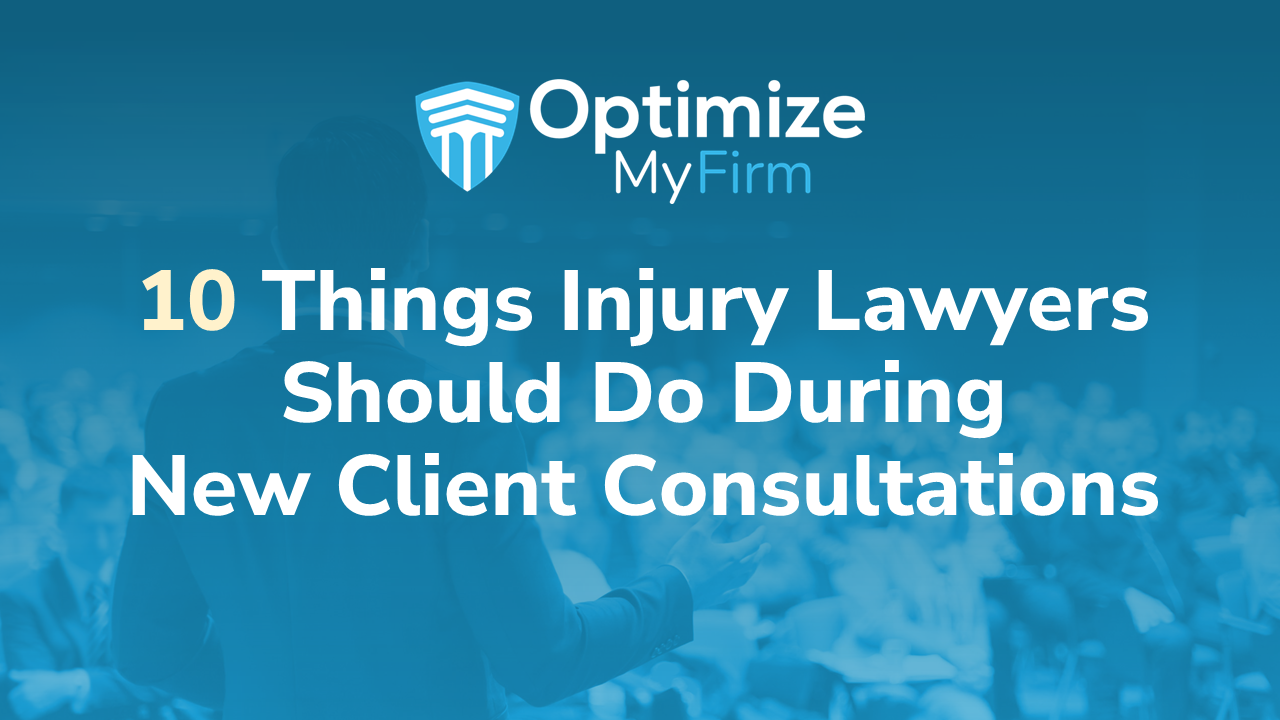
Anybody without a lawyer in the family is going to tell you that law school doesn’t prepare you for getting clients. The present public health situation does nothing to increase a private practitioner’s income or referrals either, so lawyers will want to capitalize on any opportunities that they might have to secure new work. If first impressions are as important as psychologists say they are, you might want to treat every potential client in an initial consultation as if their case will be the most important case that you’ll be taking on. You might be the only lawyer that he or she ever came in contact with in their life, but with professionality, a pleasing personality and a satisfactory result, they might just send you a referral on a case involving liability, serious damages and a defendant that has the ability to pay.
That said, here are a few things that you’ll want to do for initial consultations.
- Teach Your Secretary to Prepare You: If it’s somebody that the person who answers your phone isn’t familiar with, you’ll want to know who is calling and why they’re calling. If it’s a name that you never heard before, it’s possible that he or she is a potential new client, and you’ll likely want to speak with that person immediately. You’re establishing availability and a connection then and there. That person is more likely to make an appointment for an initial consultation and show up for it
- Get That Potential Client in Your Office: Although you’re already set up for video conferencing, if at all possible, get that person who you’re speaking with into your office. If first impressions are everything, you’ll be presented as being far more human in a face-to-face meeting as opposed to on a video screen. There’s a far better opportunity for you to evaluate the credibility and demeanor of the person you’re speaking with in a face-to-face meeting too. Meeting in person also allows that prospective client the opportunity to sign a retainer agreement and some medical authorizations then and there.
- Prepare Yourself: That prospective new client will be especially impressed if you have a copy of their accident report in front of you when they walk into your office. In smaller cities, these are readily accessible at the local police department. When that individual gets to your office, he or she might learn more about that accident than anybody involved in it knows. That’s going to create a favorable image.
- No Phone Calls: The time of that person across from your desk, on a video monitor or a phone line is valuable too. Give that individual your undivided attention. Don’t give that person the impression that there is another case out there that’s more important than their case. Phone calls can be left with your secretary or go to voice mail. Don’t feel shy about asking that the prospective client turn their phone off or put it on silent while you’re in conference.
- Let the Client Talk: Of course, you’re going to need some preliminary information beyond any initial consultation sheet that you might want to be completed. After you get the basic information that you need, let that person talk. The individual might focus on seemingly irrelevant details for a reason, and you might pick up other details from that person that are legally important.
- Understand the Client’s Concerns and Objectives: Gain an understanding of what the potential client’s concerns and objectives are relative to what you’re discussing. If the concerns aren’t realistic, you can use your time to try and bring that person back down to earth. If the objectives are malicious or vexatious, you’ll likely refuse to enter into a retainer agreement.
- How Long it’s Going to Take: You’re a lawyer and not a seer, but you should provide a best and a worst-case scenario of how long this is all going to take. Advise the individual of possible wrinkles that can delay matters along with how you plan on expediting the matter. Make it clear that certain issues might arise that are completely out of your control, but give an educated timeline that can be referred to.
- Answer Questions: You’re in a personal injury consultation. As a personal injury lawyer, you’re going to want to focus on the liability, damages and insurance aspects of the case. As soon as you obtain the client’s background history and version of events, the prospective client must be given time to ask questions though. You should be able to answer most, if not all of them. Then, you’ll want to advise the person of how you intend to fit the pieces of together to build a strong case. By the time that you’re finished, any remaining questions will likely have been answered already.
- Detail the Process: The procedure involved in a claim is entirely different than civil procedure in a lawsuit. In either case, you’ll be obtaining copies of all bills, records and reports in connection with the accident. The prospective client needs to be made aware of the fact that these take time to obtain. Whether it’s your intention to file a claim or an immediate lawsuit, you’ll want to detail each step in each process during the initial consultation. Just because it seems to them that nothing might be happening on their case doesn’t mean that their file is sitting in a corner of your office collecting dust. On the contrary, you’re diligently working on it.
- Upon Being Retained: Give the client sufficient time to review your retainer agreement and answer any questions about it as clearly as possible. Make sure that the client leaves with a copy of that agreement along with an admonition about how mentioning their accident or injuries on social media can affect their credibility and operate to devalue their case. Then, get to work, and advise the client in writing of the progress on their case every step of the way. Always take the client’s calls if you’re able to do so and respond to any written communications on a timely basis.
The initial consultation is a fundamental component of securing a new client. In this day and age, a prospective client can obtain a consultation, and lawyer can be retained without the necessity of a face-to-face meeting. That’s not good legal or people practice, and it’s not to be encouraged. The practice of personal injury law remains highly personal. Lawyers need to get to know their clients and clients need to get to know their lawyers too. If at all possible, get prospective clients through your office door for that initial consultation. You never know who they might send through your door sometime after that.
Getting them to call.
Clients must find you before you can provide them with any type of consultation. We help personal injury attorneys get more leads from Google, which is where most people are searching for an attorney. If you would benefit from more clients please see our page about personal injury attorney SEO and learn about how we’ve helped other firms. If you think we could be a match, contact us and we’ll explore how we may be able to help.

